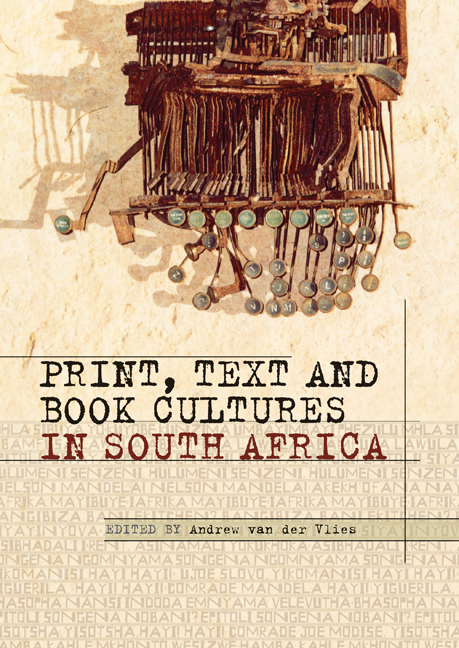Book contents
- Frontmatter
- Contents
- Acknowledgements
- Abbreviations and acronyms
- 1 Introductory
- 2 Print Cultures and Colonial Public Spheres
- 3 Local/Global: South African Writing and Global Imaginaries
- 4 Three Ways of Looking at Coetzee
- 5 Questions of the Archive and the Uses of Books
- 6 Orature, Image, Text
- 7 Ideological Exigencies and the Fates of Books
- 8 New Directions
- 8.1 The Rise of the Surface: Emerging Questions for Reading and Criticism in South Africa
- 8.2 Sailing a Smaller Ship: Publishing Art Books in South Africa
- 8.3 The University as Publisher: Towards a History of South African University Presses
- Contributors
- Index
8.1 The Rise of the Surface: Emerging Questions for Reading and Criticism in South Africa
from 8 - New Directions
Published online by Cambridge University Press: 21 April 2018
- Frontmatter
- Contents
- Acknowledgements
- Abbreviations and acronyms
- 1 Introductory
- 2 Print Cultures and Colonial Public Spheres
- 3 Local/Global: South African Writing and Global Imaginaries
- 4 Three Ways of Looking at Coetzee
- 5 Questions of the Archive and the Uses of Books
- 6 Orature, Image, Text
- 7 Ideological Exigencies and the Fates of Books
- 8 New Directions
- 8.1 The Rise of the Surface: Emerging Questions for Reading and Criticism in South Africa
- 8.2 Sailing a Smaller Ship: Publishing Art Books in South Africa
- 8.3 The University as Publisher: Towards a History of South African University Presses
- Contributors
- Index
Summary
The rise of the “history of the book” could be seen as part of a very broad set of shifts coming at the close of a particular era in literary criticism, one deeply shaped by symptomatic readings, Cold War cultural politics (in which Jameson's “political unconscious” has been signal) and anti-apartheid politics. As literary studies cast an eye towards the changing parameters of the discipline, the vectors and rubrics of what we take to be the act of reading bend and swerve under emerging pressures and in sway to new orders of twenty-first century thinking. The in-depth readings, the preoccupation with symptoms that have structured 30 years of literary work, seem incontrovertibly to be shifting into a critical landscape that opens onto questions of the literal, the surface and a conceptual language that tries to move beyond the sharp image/ text distinction we have relied on for so long. And while the North American inflections of such a set of issues might take one form, their ramifications for a form of thinking from the global South might, as I will suggest, offer different sorts of potency. It seems useful, then, to look forwards from the vantage point of the history of the book into an even wider set of questions for a global and South African-inflected literary debate.
There is an argument to be made, following recent interventions by Elaine Freedgood (2006), and Stephen Best and Sharon Marcus (2009), among others, that the method of reading that enabled a long conversation to happen across many disciplines since the 1970s was the form of symptomatic reading. The critical metalanguages that were central to that project were psychoanalysis and Marxism. And one of the most formative texts in the way we have read for the last 30 years was Frederic Jameson's The Political Unconscious, published in 1981. “If everything were transparent, then no ideology would be possible, and no domination either”, Jameson wrote then, “interpretation could never operate on the assumption that ‘the text means just what it says’” (Jameson 1981, 61).
- Type
- Chapter
- Information
- Print, Text and Book Cultures in South Africa , pp. 408 - 421Publisher: Wits University PressPrint publication year: 2012



